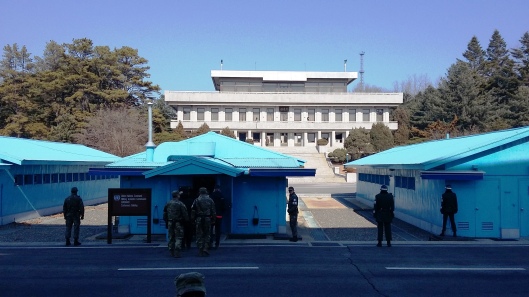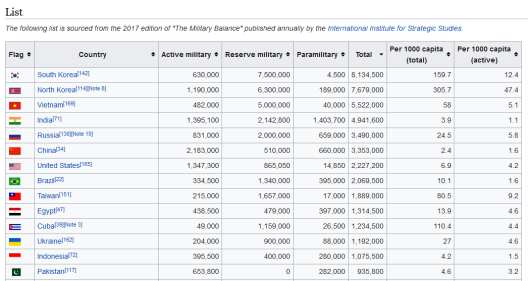
The Joint Security Area in the demilitarised zone (DMZ) between North and South Korea. American and South Korean soldier in the forground, North Koreans in the background. (Photo credit: author)
In an article for Esquire, Robert Bateman, a former American army officer, makes an argument that the US should be more grateful for Japan and South Korea. He persuasively posits that these countries are
…much more prepared than many Americans know, and with good reason: They’re a lot closer to the danger [from China and North Korea].
One of the points he uses to illustrate this is the size of South Korea’s military:
…South Korea, with a population of 51 million, has an active-duty Army that is actually a little bigger than the active US Army (490,000, versus our current 483,000 at the end of last year). At the same time, their reserve forces dwarf the US National Guard and Reserve elements. We have a total of about 820,000 part-time or emergency forces, but South Korea maintains a force of more than three million. And this is no mere mass of untrained cannon-fodder. The South Korean Army has some 2,400 tanks, and another 2,600 armored vehicles of other types.
To put this another way, the US Army has a total of 10 active-duty divisions, plus the equivalent of two or three more in non-divisional units. We have several more divisions in the National Guard, but those units generally take several months to come up to speed as trained organizations, so they are not of much use in a sudden fight. In contrast, the Republic of Korea fields a total of 49 divisions, and the equivalent of another six in non-divisional units. In other words, nearly five times what the US can put into the field around the entire planet. They can draw on their entire nation for the support they need in any fight on their own territory, and they are not designed for “expeditionary” warfare. They have one acid test, and they already experienced what happens if they are seen as “weak” by the North Koreans.
In order to get such a large force, South Korea requires every adult male to do two years of military service. Refusal to complete this service is punishable by eighteen months in prison. There is no allowance for conscientious objection. By all accounts it is brutal. Young men dread it and basically no one I have spoken to has anything nice to say about their time in the military. Armies tend to be deeply hierarchical organisations and Korea is a hierachical society, a combination that results in a situation where – to quote one of my friends – officers treat conscripts and subordinates ‘like slaves’. That may sound like hyperbole but earlier this year a general resigned after the military’s human rights commission found that service men assigned to his residence:
“had to stay on duty 24/7, wearing electronic bracelets to be alerted whenever they are needed. One of them was coerced into attending church services, although he was Buddhist. In addition, the soldiers were ordered by [General] Park’s wife to pick up clipped toenails and dead skin cells from the sofa. They were forced to be on duty from 6 a.m., when the general went for his early morning prayers, to 10 p.m. when he went to bed, regardless of their official working hours[.]
One soldier at Park’s house had to wear an electronic paging device on his wrist to respond swiftly to calls from [General Park’s] wife, who threatened him to send to (sic) a military prison when he failed to react in time because of a discharged battery,
And most dramatically:
The wife threw a pancake at one soldier when he forgot to bring it to her son, hitting him in the face.
The situation is predictably even worse for young people in North Korea. Women serve for seven years, whilst men are in the military for a decade. Low rations appear to take many soldiers close to starvation and desperate enough to steal food from civilians. A poor diet and hygiene may explain why a North Korean soldier who recently defected via the DMZ was found to have a 27cm parasitic worm in his stomach. The situation is even worse for female soldiers, who generally have a lower rank and appear to be frequent targets of sexual abuse.
While neither of these systems is pretty, they do allow the two countries to field huge militaries. Counting both active and reserve forces, the two Koreas have the largest militaries in the world. Note, that’s not combined but individually. South Korea has the largest, the North the second largest. That’s not counting the American soldiers stationed in South Korea. The result is that in the event of a conflict there would be almost 14 million combatants involved, even before international allies began sending forces to assist South Korea.
This is worth bearing in mind whenever people talk about pre-emptive strikes on North Korea or take actions that might provoke the regime such as tweeting that their leader is ‘short and fat‘. If those actions lead to a war – even a conventional one in which China did not intervene – we’d likely be looking at a war that involved the kind of casulties the world has not seen for decades.

